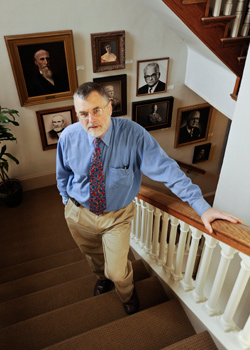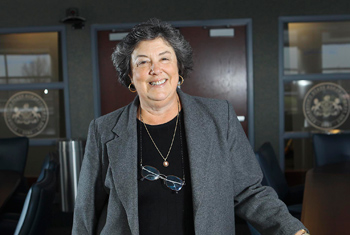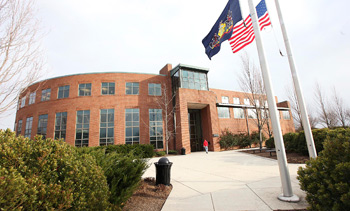 In Pennsylvania, there is no shortage of success stories involving the commercialization of university research. With international powerhouses like the University of Pennsylvania in the East, Carnegie Mellon University in the West and Penn State University’s main campus in the center of the state, Philadelphia, Pittsburgh and even rural State College have all benefited from faculty-led research, as new or existing companies within their respective regions and statewide have helped bring the discoveries from the lab to the marketplace.
In Pennsylvania, there is no shortage of success stories involving the commercialization of university research. With international powerhouses like the University of Pennsylvania in the East, Carnegie Mellon University in the West and Penn State University’s main campus in the center of the state, Philadelphia, Pittsburgh and even rural State College have all benefited from faculty-led research, as new or existing companies within their respective regions and statewide have helped bring the discoveries from the lab to the marketplace.
Pairing industry with smaller institutions of higher education and in more rural parts of the state is a different story altogether. Take Lancaster’s Franklin & Marshall College, which is 223 years old and just earned its first patent in October via the work of associate chemistry professor Ryan Mehl, who developed a technique for viewing proteins. It’s why the Innovation Transfer Network, a first-of-its-kind state-led effort, exists–to connect business with innovation originating at dozens of colleges throughout Central PA. On a smaller but more intimate scale, three local schools are also involved in a National Science Foundation grant that is examining the relationship between academic researchers and industry.
 “It’s different from other ways we’ve engaged before. F&M has been part of Lancaster County for (more than) 200 years,” says Richard Fluck, Franklin & Marshall’s associate dean of faculty. “We’ve had very little community engagement in an entrepreneurial sense. It will be interesting to see how F&M begins working with local industries and startup companies.”
“It’s different from other ways we’ve engaged before. F&M has been part of Lancaster County for (more than) 200 years,” says Richard Fluck, Franklin & Marshall’s associate dean of faculty. “We’ve had very little community engagement in an entrepreneurial sense. It will be interesting to see how F&M begins working with local industries and startup companies.”
While Mehl will be a good case study–his invention is expected to draw attention from the biotech industry, which has a strong presence in PA–so will the NSF grant involving F&M, Penn State-Harrisburg and Dickinson College, which are collaborating with nine other small- to mid-sized colleges in the region. The $600,000 two-year grant called, “Overcoming Cultural Chasms: Maximizing Innovations for Smaller University/Industry Partnerships,” was awarded to Penn State-Harrisburg in Sept. 2009.
Since then, faculties at participating schools have participated in a survey, as part of the grant’s first phase, where faculties provided information on what instruments they have available for industry-based commercialization projects. Another survey is being created to find out whether faculty would even be interested in partnering with industry for such endeavors. With more limited resources than faculty at larger institutions, it is often difficult for small-school profs and researchers to be as entrepreneurial as they’d like.
 “The door is always open to participate. Some will jump at the opportunity, some won’t give it a second thought,” says Marian Walters, the dean of research and graduate studies at Penn State-Harrisburg who secured the NSF grant. “However it’s a tremendous opportunity for faculty members to develop projects beyond the limit of resources that that they otherwise would not have access to at their own institutions.”
“The door is always open to participate. Some will jump at the opportunity, some won’t give it a second thought,” says Marian Walters, the dean of research and graduate studies at Penn State-Harrisburg who secured the NSF grant. “However it’s a tremendous opportunity for faculty members to develop projects beyond the limit of resources that that they otherwise would not have access to at their own institutions.”
More specifically, the projects will be based on translational research, which involves moving knowledge and discovery gained from basic sciences to its application in clinical and community settings. Interested faculty members are now in the midst of applying for mini-grants of up to $25,000 that will support certain research between academic researchers and businesses. This year there was a competition where three grants were awarded for projects. One that hasn’t been yet made public is based on development of a new method of drug delivery. Next year, seven additional grants will be awarded to faculty members.
One example of translational research in action in the region is the Clinic for Special Children in Strasburg, a nonprofit medical center for Amish or Mennonite children with inherited metabolic disorders. Fluck says that through translational research doctors at the clinic have been able to find treatments for some of those disorders.
 Fluck says the grants could help grow countless new partnerships between academic institutions and businesses in many areas including, but not limited to, the creation of medical devices and biofuels.
Fluck says the grants could help grow countless new partnerships between academic institutions and businesses in many areas including, but not limited to, the creation of medical devices and biofuels.
“There has to be economic viability in this part of the state for colleges and universities to survive,” Fluck says, “The two (schools and businesses) need each other.”
Fluck says it will be interesting to see how F&M’s faculty reacts to the opportunity to engage in this type of research.
“It’s a new idea at least for the science faculty and could provide research opportunities for undergraduate students,” Fluck says.
Walters says although faculties at the three participating schools have expressed an interest in building these types of partnerships with business, it’s more difficult for smaller academic institutions to enter partnerships with industry because of finances and other limitations. “Many (schools) don’t have the resources and there’s a huge learning curve especially in terms of connecting with businesses,” Walter says.
 “Some faculties are having difficulty finding businesses that will match funds because many businesses are small or early stage companies where resources are limited,” Walters says.
“Some faculties are having difficulty finding businesses that will match funds because many businesses are small or early stage companies where resources are limited,” Walters says.
For Sairam Rudrabhatla, a scientist at PSU Harrisburg, partnering with industry to research and develop products is natural. Rudrabhatla is now partnering with Pennsylvania-based Kunj Biotech LLC, Ernst Conservation Seeds, and Keystone Biofuels to create new feedstock for biofuels that will lessen the negative impact of non-living factors on the living organisms in a specific environment.
“I am in this calling to help make our world a better place,” Rudrabhatla says. “So I have no concerns whether anything I make or develop will bring me monetary gain.”
While partnerships between academic researchers and industry have not been prevalent in the past, Ramon Escudero, Keystone Innovation Zone Program Coordinator at the Lancaster Chamber of Commerce, says more startup companies are becoming interested in partnering with academic institutions because the concept is gaining more attention throughout the country and the state. It has certainly become a point of emphasis for NSF and entrepreneurship advocates.
 “More businesses are liking the idea better because these partnerships are known for all the results that have been accomplished,” Escudero says.
“More businesses are liking the idea better because these partnerships are known for all the results that have been accomplished,” Escudero says.
Fluck agrees with Escudero that partnerships between academic researchers and businesses are absolutely more important.
“It’s not going to happen overnight but something is starting to grow and emerge here,” Fluck says.
Walters said she is looking forward to see how this particular grant will act as a lead for future initiatives between academic researchers and industry.
“I think it’s a marvelous opportunity between faculty and business,” Walters says. “We are seeing ongoing progress on a month-to-month basis.”
Madelyn Pennino is a freelance writer based in Lancaster. Send feedback here.
To receive Keystone Edge free every week, click here.
PHOTOS:
Dr. Richard Fluck, Associate Dean of the Faculty, outside the Old Main on the campus of Franklin & Marshall BRAD BOWER
Students walk past the renovations to academic buildings on the main campus of Franklin & Marshall BRAD BOWER
Dr. Richard Fluck, Associate Dean of the Faculty, on the historic stairs inside Old Main BRAD BOWER
Marian Walter at Harrisburg University MICHAEL BUPP
PSU Harrisburg Olmsted building MICHAEL BUPP
